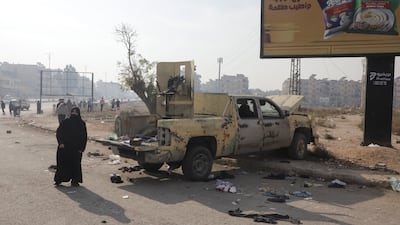Syrian rebels were preparing for battle on Saturday at the gates of Damascus, seat of President Bashar Al Assad's power, after saying they have taken two towns within a 20-kilometre radius of the city.
“Our forces have started executing the final stages of encircling the capital,” Syrian rebel spokesman Hassan Abdul Ghani said on Telegram.
The fall of Damascus would further loosen the six-decade grip of Syria's ruling Alawite elite on the majority Sunni country. But other opposition sources cautioned that the rebels have not fully encircled the city, with the main motorway leading north to the coast remaining open. The bulk of the Syrian army had withdrawn to the capital, they said.
US President-elect Donald Trump on Saturday said Russia, Mr Assad's most powerful ally, is now incapable of helping him because it already took many losses in Ukraine. He said Syrian rebels are “obviously preparing to make a very big move toward taking out Assad".
On Saturday afternoon, residents took control of the mostly Druze suburb of Jaramana on the southern edge of Damascus, a network of citizen journalists said, as security forces vacated the outskirts of the capital.
Hours earlier, rebels said they had captured Sanamyn and Sasa, two towns 20 kilometres to the south and west of the capital, as security forces abandoned dozens of bases, prisons and other compounds in the governorates of Quneitra, Deraa, and Suweida.
Suwayda 24 published a video of people bringing own a statue of Hafez Al Assad, father of the current president Bashar, in the centre of Jaramana, which is situated near the road to Damascus International Airport.
The rebel sweep from the north, which has already resulted in the fall of Aleppo, Syria's business capital, and the main city of Hama, has been accompanied by a disintegration of regime forces elsewhere in the country. On Friday, security forces pulled out from most areas in the southern governorates of Suweida and Deraa, which border Damascus. A pro-US Kurdish militia also took control of large parts of the east.
The only counterweight to the sweep appears to be the Russian air force, which has intensified its bombing on rebel targets in the northern countryside of Homs, widely seen as a staging post for any final move on the strategic city, which links Damascus to the coast.
The rebels launched the offensive from their base in Turkey's sphere of influence in Syria just days ago. Since Syria's civil war began 13 years ago, the country has become fragmented into four zones controlled by Iran, Russia, Turkey and the United States. But the rebel advances have massively undermined Russia and Iran's reach.
"We are witnessing an earthquake," said prominent opposition figure Fawaz Tello, who called on western powers to open a "new page" with Syria's political opposition after years of trying to reach an accommodation with Mr Al Assad to stem the flow of Syrian refugees into Europe.
Moscow, Mr Al Assad's most powerful backer, appears to be diluting its support for him. A source close to the Kremlin told Bloomberg that Russia does not have a plan to save Mr Al Assad and does not see one emerging as long as the Syrian army continues to abandon its positions.

However, one opposition member said that although there had been signals of a lessening in Moscow’s support for Mr Al Assad, Russia was lending more air support for the Syrian military in Homs, a strategic city linking Damascus with the coast. But opposition formations began a new push on Saturday to capture the city.
The rebels started the attack with artillery bombardment and drone attacks on Mallouk, a large army road block on the M5 highway, and the Airforce Intelligence headquarters in the north of the city, opposition sources said. Another attack simultaneously was launched from the east of the city, after rebels captured two villages in the area.
“Homs is the centre of the regime’s weapons production, so in a way it is more important than Damascus,” the opposition member said, referring to ammunition and other factories in the city.
One western military official told The National that a significant part of Syria’s remaining stockpiles of chemical weapons, which it did not give up in violation of a 2013 deal brokered by Russia, are located in Homs.
The rebel offensive in the north is being spearheaded by Hayat Tahrir Al Sham, an Al Qaeda offshoot with open channels to Turkey. It is led by Ahmed Al Shara, previously known as Abu Mohammad Al Julani. He has declared that the goal of the attack is to take Damascus and dispose of Mr Al Assad's "tyranny".
The southern governorates, however, have mostly fallen to an amalgamation of local forces and past rebels who were defeated after Russia intervened to prop up Syria's system of rule in 2015.
In Homs, rebel reconnaissance drones flew over the city on Saturday, but the attacking forces have not made a final push to capture it after taking the northern countryside. Homs is strategic because it is the main link between the coastal Alawite mountains, the heart of Mr Al Assad's sect, and his seat of power in Damascus.
A member of the rebel command said that a contingent of 200 guerrillas from the Lebanese Shiite group Hezbollah had deployed near a military college at the northern entrance of the city, where the army has built a defensive line.
An Army defector working with the rebels said that they could try to take the city by mounting a pincer movement, similar to the strategy they adopted when taking the city of Hama last week.
"They might also bypass Homs all together and head to Damascus," he said.
Additional reporting by Tom Watkins in Washington


